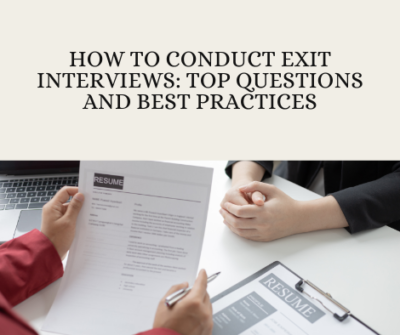Exit interviews are a valuable tool for organizations to gain insights into employee experiences and identify areas for improvement. Conducting effective exit interviews involves asking the right questions and following best practices to ensure a productive dialogue. Here’s how to do it:
Top Questions to Ask in Exit Interviews
- What prompted your decision to leave the company?
Understanding the primary reasons behind the employee’s departure helps identify trends and areas for improvement. - How would you describe your overall experience working here?
This question allows the employee to share their general feelings about the work environment and culture. - What did you like most about your job?
Identifying positive aspects can help reinforce effective practices within the organization. - What were the challenges you faced in your role?
Gathering insights on challenges can highlight areas where the company can improve processes or support. - Do you feel you received adequate training and development opportunities?
This question assesses whether the organization is meeting employees’ professional growth needs. - How would you rate the communication within your team and the organization?
Evaluating communication effectiveness can lead to improvements in team dynamics and information flow. - What suggestions do you have for improving the workplace?
Employees may offer valuable feedback that can lead to actionable changes in the organization. - Would you consider returning to this company in the future? Why or why not?
This question provides insight into the organization’s reputation and how it’s perceived by former employees.
Best Practices for Conducting Exit Interviews
- Create a Comfortable Environment:
Ensure the exit interview setting is private and relaxed, encouraging honest and open communication. - Choose the Right Timing:
Schedule the exit interview close to the employee’s last day to gather fresh insights while ensuring they are not overwhelmed with final tasks. - Use Open-Ended Questions:
Encourage detailed responses by asking open-ended questions rather than yes/no questions, fostering a more in-depth discussion. - Listen Actively:
Pay close attention to the employee’s responses and ask follow-up questions to clarify points. This shows that their feedback is valued. - Maintain Confidentiality:
Assure the departing employee that their feedback will be kept confidential and used constructively to improve the organization. - Document Feedback:
Take detailed notes during the interview to capture insights and trends that can be shared with relevant stakeholders for future improvements. - Analyze Data Trends:
Regularly review exit interview feedback to identify patterns and trends that can inform HR policies and employee engagement strategies.
By following these questions and best practices, organizations can conduct effective exit interviews that provide valuable insights, improve retention, and foster a positive workplace culture.
“Kickstart your HR career at Next Innovation Asia! Gain essential skills, certified training, and valuable job support. Join us today!”

